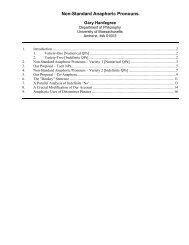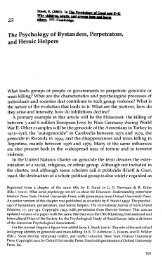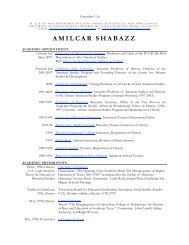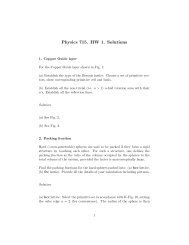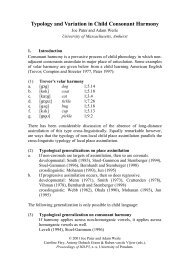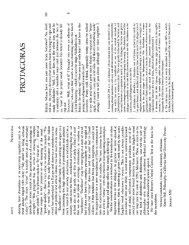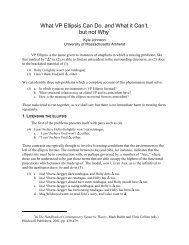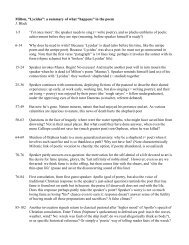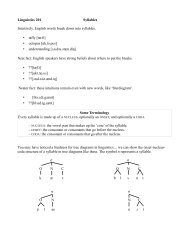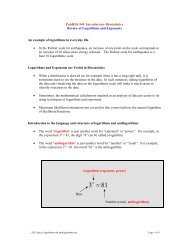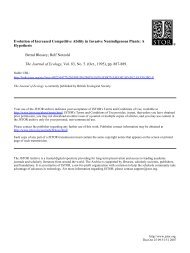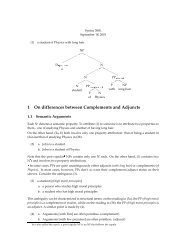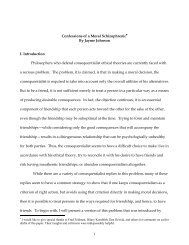Aristotle's Definitions of the Soul: "De Anima" ii, 1-3
Aristotle's Definitions of the Soul: "De Anima" ii, 1-3
Aristotle's Definitions of the Soul: "De Anima" ii, 1-3
Create successful ePaper yourself
Turn your PDF publications into a flip-book with our unique Google optimized e-Paper software.
means "that certain familiar." This is made clear by an important passage in <strong>the</strong> Physics<br />
(1, 1, 184 a 16 - b 14, at a 26, ff.) which reveals that initial (nominal) definitions in science<br />
are accounts by reference to actual cases <strong>of</strong> <strong>the</strong> entity defined which are familiar to us.<br />
These definitions focus by means <strong>of</strong> such a reference onto a certain familiar whole (QXov<br />
n). See ESTA, Sec. 7.<br />
27 Here and in what follows I make explicit in paren<strong>the</strong>ses various features <strong>of</strong> nominal<br />
definitions which Aristotle himself normally only brings out in <strong>the</strong>oretical discussions <strong>of</strong><br />
definition. See nn. 25-26, Sec. 7 below, and ESTA, Secs. 6-9.<br />
28 In <strong>the</strong> fourth definition '"oLoa&' (412 b 16) functions as 'fIs' does in <strong>the</strong> nominal<br />
definitions at PosteriorAnalytics 93 a 22-24 to indicate that it is a special sort <strong>of</strong> body that<br />
is in question here (cf. 'roip,& a6paxn, b I 1) and not just any body with an internal source<br />
<strong>of</strong> change. That sort is "<strong>the</strong> most familiar sort" with an internal source <strong>of</strong> change and it is<br />
<strong>the</strong> function <strong>of</strong> <strong>the</strong> 'roLoo00' to signify this. (Cf. Metaphysics, 1035 b 16 and 1043 a 36,<br />
where 'To&6a8E' and 'Tus' play, interchangeably, this role.) So understood <strong>the</strong> definition<br />
does provide a sufficient condition.<br />
29 It is not here assumed that Aristotle ever succeeds in adequately differentiating <strong>the</strong><br />
innate capacity for motion <strong>of</strong> living things, especially plants, from <strong>the</strong> innate impulse to<br />
motion (Physics 192 b 18) possessed by al inanimate natural objects. See F. Solmsen,<br />
<strong>Aristotle's</strong> System <strong>of</strong> <strong>the</strong> Physical World (Ithaca, 1960), 95-102. But <strong>the</strong> fourth definition<br />
<strong>of</strong> soul leaves open <strong>the</strong> possibility <strong>of</strong> a solution.<br />
30 This rules out <strong>the</strong> reading <strong>of</strong> 414 a 27-28 in J. Owens, "<strong>Aristotle's</strong> <strong>De</strong>finition <strong>of</strong> <strong>Soul</strong>,"<br />
in R. B. Palmer and R. Hamerton-KeUy (eds.) Philoma<strong>the</strong>s (The Hague, 1971), at n. 29.<br />
31 Assuming <strong>the</strong> primacy <strong>of</strong> <strong>the</strong> actuality <strong>of</strong> a function to <strong>the</strong> function, as at 415 a 18-20.<br />
This step in <strong>the</strong> argument is not explicit but it is easily supplied.<br />
32 In fact <strong>Aristotle's</strong> claim at 413 b 24-27 is <strong>the</strong> stronger claim that "it is likely (Iotxe) that<br />
<strong>the</strong> intellect is a different type <strong>of</strong> soul, and it alone is separable." That 'IOLXE' has this force<br />
is clear from <strong>the</strong> parallel passage 408 b 18-29 (cf. 430 a 17-25).<br />
33 It might be suggested that <strong>the</strong> definition <strong>of</strong> II, I is a nominal definition <strong>of</strong> <strong>the</strong> sort that<br />
exhibits necessary conditions for <strong>the</strong> presence <strong>of</strong> soul. If so, <strong>the</strong>n according to <strong>the</strong> pattern<br />
at Posterior Analytics 94 a 3-9 <strong>the</strong> new definition <strong>of</strong> II, 2 would be a combination <strong>of</strong> <strong>the</strong><br />
old definition <strong>of</strong> II, I and what we have been calling <strong>the</strong> new definition. In that case <strong>the</strong><br />
correct new definition would be: <strong>Soul</strong> is <strong>the</strong> source (&p <strong>ii</strong>) <strong>of</strong> any group <strong>of</strong> <strong>the</strong> life<br />
functions, which source is always possessed (as first actuality) by a natural body which<br />
has life potentially. In this case each type <strong>of</strong> soul would have to be a function <strong>of</strong> some<br />
natural body. But Aristotle denies having claimed this in <strong>the</strong> very place where he is<br />
developing his new definition (413 b 13-16, 24-29). So his new definition can hardly have<br />
this form.<br />
34 "Source <strong>of</strong> life" (&PX. Tow iv,<br />
413 b 11-13 with a 22-25) may seem ra<strong>the</strong>r thin and<br />
commonplace for a real definition. But Politics 1275 a 38 - b I shows that genera <strong>of</strong> <strong>the</strong><br />
type to which soul belongs are very thin in content (cf. <strong>De</strong> A nima 414 b 28-32) and <strong>the</strong> real<br />
definitions <strong>of</strong> entities <strong>of</strong> this type may be quite commonplace (see Politics 1279 a 25-27<br />
with 1278 b 8-10, ff., and for <strong>the</strong> sort <strong>of</strong> definition <strong>of</strong> figure probably in view at <strong>De</strong>Anima<br />
414 b 20, ff., see Euclid, Elements I, <strong>De</strong>f. 14). The account <strong>of</strong> II, I may also seem ra<strong>the</strong>r<br />
technical for a nominal definition. But even a relatively advanced account may still be<br />
what is "familiar to us" and only nominal. (See <strong>the</strong> nominal definition <strong>of</strong> squaring at 413<br />
a 16-19; cf. Politics 1275 a 29-34 and n. 25 above.)<br />
35 Note that <strong>the</strong> new definition <strong>of</strong> II, 2 is not defective in this way - ano<strong>the</strong>r reason for<br />
not taking it to be <strong>the</strong> inferior definition in view at 413 a 11, ff. Cf. n. 4 above.<br />
277



